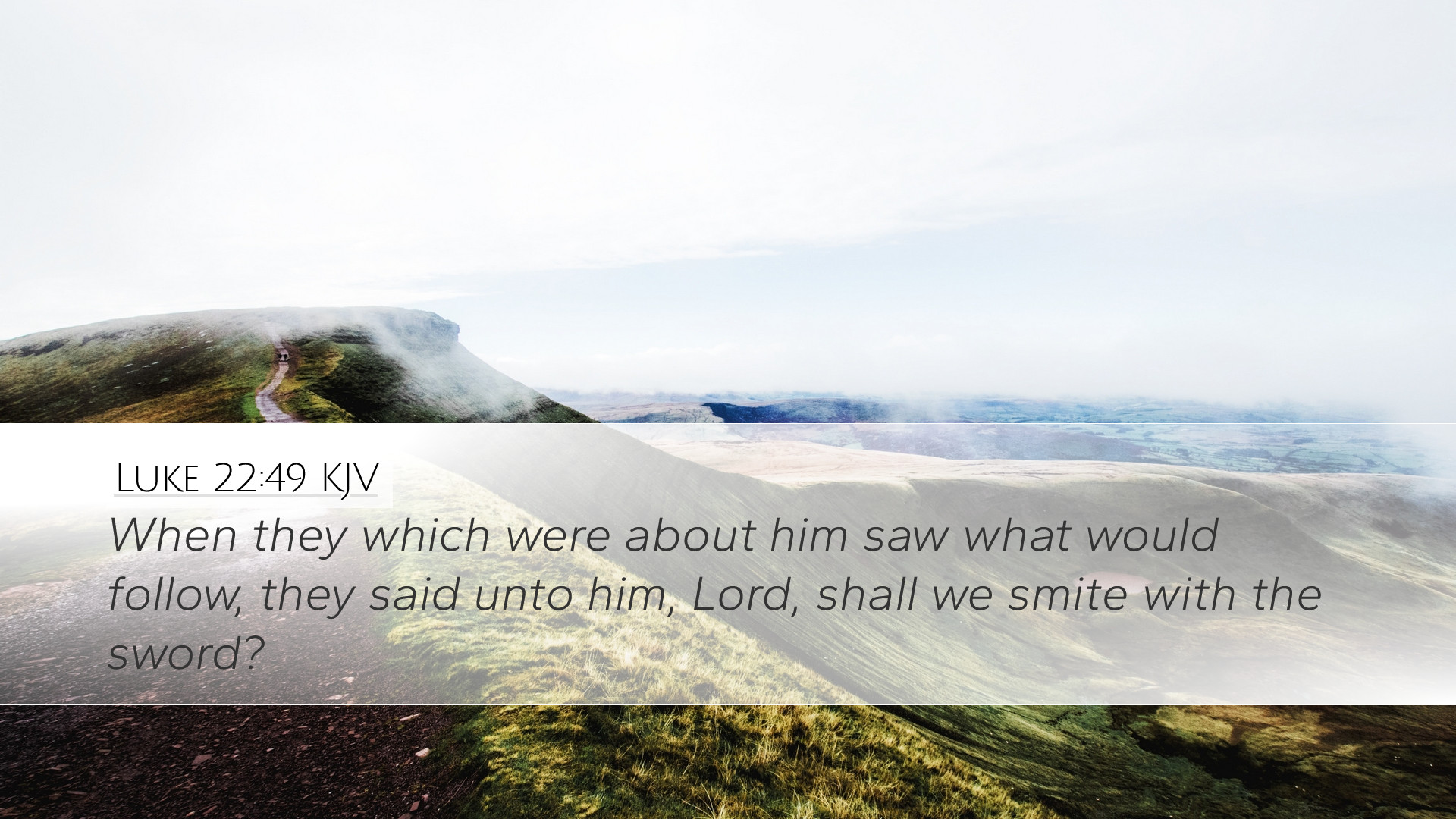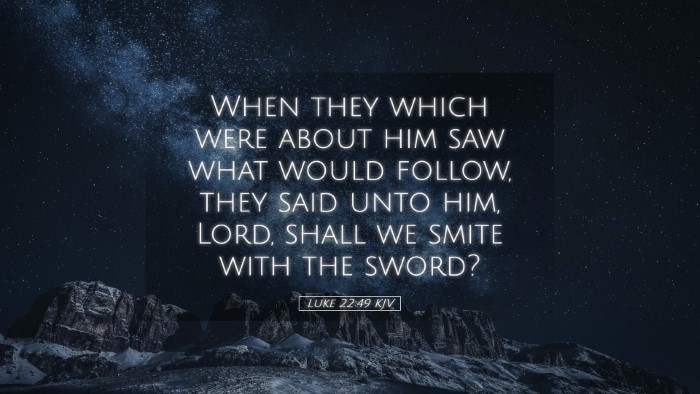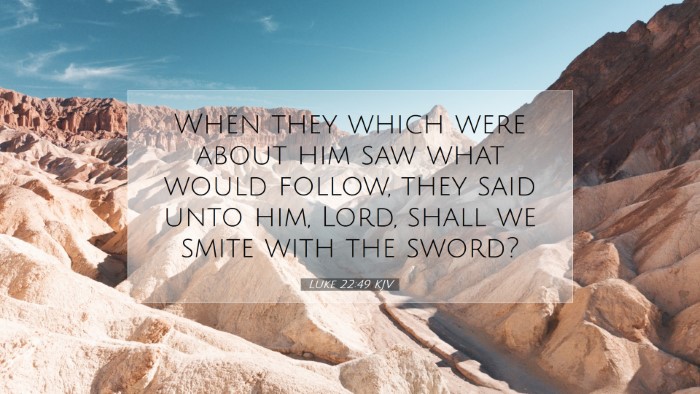Bible Verse: Luke 22:49
“When they which were about him saw what would follow, they said unto him, Lord, shall we smite with the sword?”
Contextual Background
Luke 22:49 is situated in a pivotal moment in the New Testament narrative, occurring just before the arrest of Jesus. In this passage, the disciples are faced with the threat of violence from those who have come to apprehend Jesus in the Garden of Gethsemane. The tension of the moment is palpable, underscoring the disciples' confusion and fear in light of impending conflict.
The Disciples' Reaction
According to Matthew Henry, the disciples’ query, “Lord, shall we smite with the sword?” reflects their instinctive reaction to defend Jesus. This response reveals their misunderstanding of the nature of Christ’s mission; they believed in a militant messiah rather than the suffering servant foretold in Scriptures (Isaiah 53).
Henry emphasizes that the disciples often saw Jesus in terms of worldly power, failing to grasp the significance of His upcoming death and resurrection. Their question indicates a readiness to use violence in the face of adversity—a stark contrast to the teachings of Jesus regarding love, humility, and peacemaking.
Analysis of the Question
Albert Barnes elaborates on the disciples’ question, framing it as emblematic of their inner turmoil. They were confronted with a choice between faith and fear, a theme that resonates through the Christian experience. Barnes suggests that their inquiry is indicative of the natural human response to danger, yet it highlights a lack of understanding of Jesus' intentions. The question "Lord, shall we smite with the sword?" is a reflection of their struggle to reconcile their loyalty to Jesus with the reality of His impending betrayal and capture.
The Implications of Violence
Adam Clarke offers insight into the implications of resorting to violence as a means of defense. He asserts that the use of force is contrary to the teachings of Christ, who repeatedly advocated for peace and reconciliation. In this instance, Clarke notes how the disciples were inclined to aggression, yet Jesus’ response (which follows this query) serves as a corrective, reinforcing the principle that resorting to violence is not the answer to injustice.
Clarke further explains that this moment serves as a prelude to the larger spiritual conflict that Jesus is about to face. The disciples' temptation to respond with the sword mirrors humanity’s recurring inclination to solve problems through violent means rather than seeking divine intervention through prayer and faith.
Theological Reflections
This passage invites reflection on the nature of Christian discipleship. The short-lived bravery depicted in the disciples’ readiness to draw swords stands in stark contrast to Jesus, who modeled a path of submission and sacrifice. Henry suggests that this moment teaches future generations of believers the importance of looking to Jesus for guidance in moments of crisis, rather than relying on human instinct.
Moreover, this event foreshadows the transformative journey of the disciples following the resurrection. They would learn to embody the principles of peace, grace, and sacrificial love—a critical lesson as they would soon face persecution and opposition. The initial instinct to resort to violence would later be replaced by a commitment to the gospel, which calls us to love our enemies and pursue peace.
Practical Application for Believers
For pastors, students, theologians, and Bible scholars, Luke 22:49 serves as a poignant reminder of the challenges facing believers in a world often marked by conflict and strife. Reflecting on this passage urges a reevaluation of our responses to threats and adversity.
- Encourage Prayer Over Violence: In the face of personal or communal crisis, Christians are called to seek divine guidance through prayer rather than resort to aggressive methods.
- Embrace the Call to Peace: Just as Jesus exemplified love and restraint, believers are called to embody the principles of the Kingdom of God, which prioritize peace over retaliation.
- Discipleship Requires Understanding: It is crucial for believers to engage deeply with the teachings of Christ, striving to understand His mission, especially during times of uncertainty.
The exploration of this verse prompts believers to reflect on their identity as representatives of Christ in a conflicted world. The readiness of the disciples to draw swords is emblematic of humanity's tendency to rely on strength; thus, the call to discipleship is a call to transformation—one that underscores the importance of carrying the message of peace into every situation.
Conclusion
Luke 22:49 is a deeply significant verse that encapsulates the tension between human instinct and divine purpose. Through the insights of Matthew Henry, Albert Barnes, and Adam Clarke, we are encouraged to delve beyond the surface of this moment, recognizing the profound spiritual lessons it offers. As the church continues in this world filled with challenges, may we look to the example of Jesus, embracing His call to peace and understanding that true strength lies not in the sword, but in love, grace, and faithfulness to God’s ways.


